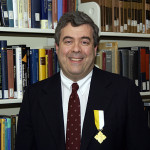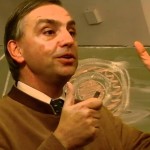God, Professors, and Evolutionary Biology Classes
by Dr. Stacy Trasancos
Filed under Christianity and Science, Evolution
Professor David P. Barash recently wrote an opinion column in the New York Times titled “God, Darwin and My College Biology Class.” Professor Barash is in the psychology department at the University of Washington. He teaches courses on sociobiology. He explained in his essay why he gives undergraduate students “The Talk.” No, it’s not about sex. The Talk is about faith and science. He says:
"And that’s where The Talk comes in. It’s irresponsible to teach biology without evolution, and yet many students worry about reconciling their beliefs with evolutionary science. Just as many Americans don’t grasp the fact that evolution is not merely a “theory,” but the underpinning of all biological science, a substantial minority of my students are troubled to discover that their beliefs conflict with the course material.
Until recently, I had pretty much ignored such discomfort, assuming that it was their problem, not mine. Teaching biology without evolution would be like teaching chemistry without molecules, or physics without mass and energy. But instead of students’ growing more comfortable with the tension between evolution and religion over time, the opposite seems to have happened. Thus, The Talk."
While professor Barash’s essay may upset some people, it does not ruffle me much. I have no problem with the above statement. To the extent that the “tension between evolution and religion” is interfering with his biology classes, yes, the teacher needs to address that tension and avoid distractions. Long tangents about religion can distract from teaching the science. Besides, there is a vast array of opinions about how to interpret the two in light of each other.
Barash noted with chagrin that Stephen J. Gould’s NOMA (non-overlapping magisteria) is the “received wisdom in the scientific establishment.” NOMA basically holds that science and religion can coexist in their own separate spheres and minimally inform each other in the search for truth. Barash believes that the two cannot stay separate, and he feels that “accommodating” religion imposes some “challenging mental gymnastic routines.”
I agree that the two cannot stay separate, but I take exception to his solution. In “The Talk” he tells students that as evolutionary science has progressed, the “space” for faith has narrowed. He tells them that “no literally supernatural trait has ever been found in Homo sapiens,” and that we are all just animals. He tells them that “living things, including human beings, are produced by a natural, totally amoral process, with no indication of a benevolent, controlling creator.” He concludes by telling them that it is not the duty of science (or science professors) to do the mental gymnastics to reconcile faith and science.
But here’s the thing. Rather than bringing clarity to the classroom, Barash brings more confusion by imposing his own beliefs about religion. It is enough to say, “This is a science class, please do not distract the class with questions about religion.” But what does he do? He imposes his beliefs on the students by making the very statements about faith that he asks the students to avoid. He is the one bringing religion into his science class.
But what about those tensions? Where should they be discussed? They need to be discussed outside of science class and with the guidance of someone competent to instruct in the faith. A lot of believers add to the confusion too, particularly those who think everyone must agree with their scientific interpretations to have real faith. In my opinion, people on all sides of the evolution and religion debate get too worked up and too impatient trying to claim all the answers. By our very human nature, we do not know everything and never will. We advance in knowledge. We are discursive creatures. It’s perfectly acceptable, even laudable, to say, “I don’t know.” By defining what you do not know, you more effectively guide your discovery. The apparent conflicts or tensions between science and faith are not the result of God’s incomplete knowledge or poor planning; they are the result of our partial understanding. We explore into the mysteries to seek more understanding. Scientists know this intimately, though some of them will not admit it.
We don’t know exactly how humans or anything else evolved, just that it all did. Catholics don’t know exactly how God created the first man and woman, just that he did. Catholics don’t know exactly how God might have guided the evolutionary process, instituted physical laws, or granted free will and intellect to the human being. They just know that he did, he does, and he will. Our theories are explanatory; we try to find explanations by forming hypotheses and testing them. The work of science is to discover how the material world works. Regarding faith, Catholics have the divinely revealed deposit of truth, i.e. Scripture and Tradition upon which dogma is founded. The work of theology is to understand those truths and to interpret and communicate them. Science can indeed be guided by faith, and faith can indeed be enriched by science—but only if you have faith. Does it require challenging intellectual effort? Yes. But so what?
A believer needs only to state that he or she sees science as the study of the handiwork of God. Note, that is not an argument but a statement. Nothing about evolutionary theory can ever be a threat to faith because believers interpret scientific discovery in a fuller scope of reality. Where faith is certain, science—never forget this—is provisional. If you are so inclined, study evolutionary theory in confidence. It is fascinating and underpins biological sciences just as Barash says it does. And if your science teacher is not religious? You probably shouldn’t consider him an authority on faith.
Never forget this either. The non-religious worldview is ultimately incoherent because science only gets you so far. Science points to greater realities beyond it. Even the scientific method demands a Christian worldview. To do science, we all have to view the world as ordered, symmetrical, intelligible, and predictable, and we have to fundamentally believe that we are rational beings who can gain knowledge about our world.
If people do not understand what I have just said, then yes, evolutionary theory may seem to threaten the “space” for faith. I really don’t know how to address this problem except to say that it demonstrates precisely why religious education needs to precede science education in priority, consistent with the words of Christ, “For what doth it profit a man, if he gain the whole world, and suffer the loss of his own soul?” The student who is confident in his or her faith should be free to study science and the professor free to teach it without invoking his own mental gymnastics routines to try to avoid mental gymnastics routines. This human endeavor we call science ought to unite us, plain and simple.
Related Posts
Note: Our goal is to cultivate serious and respectful dialogue. While it's OK to disagree—even encouraged!—any snarky, offensive, or off-topic comments will be deleted. Before commenting please read the Commenting Rules and Tips. If you're having trouble commenting, read the Commenting Instructions.












